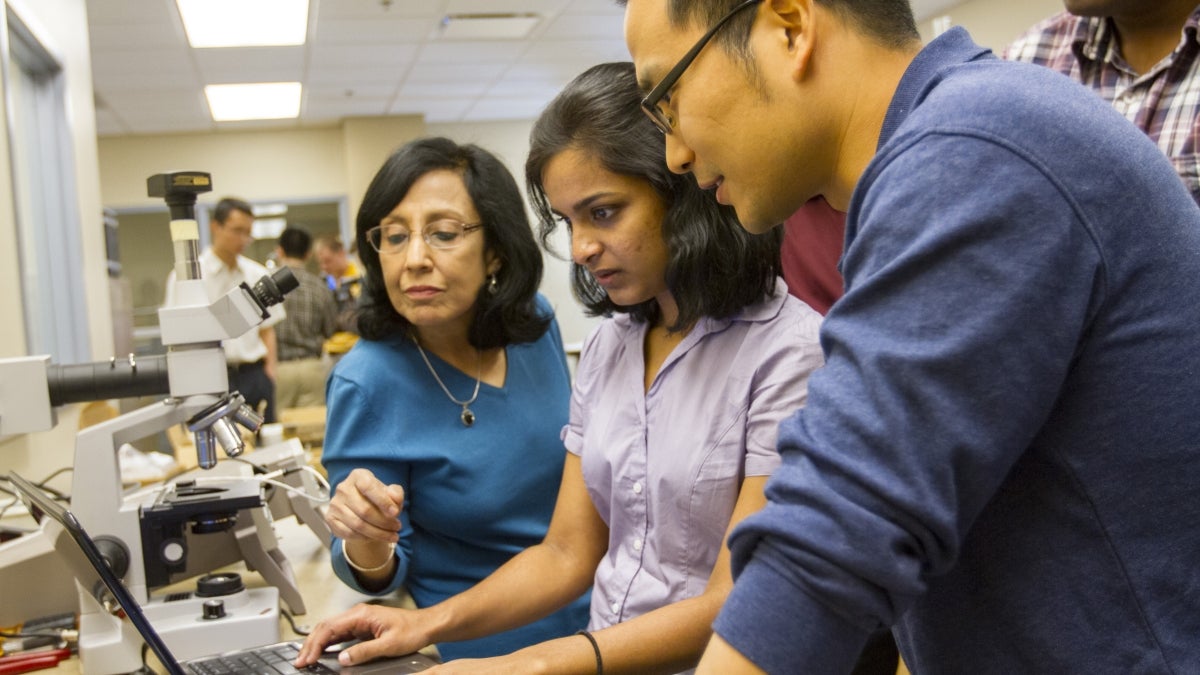Amelia Earhart Fellowship will propel ASU student’s aerospace materials research

Aerospace engineering doctoral student Nithya Subramanian (center), recently named an Amelia Earhart Fellow by Zonta International, has been studying multifunctional nanocomposites for aerospace applications in the lab of ASU professor Aditi Chattopadhyay (left) for six semesters. Photo by Jessica Hochreiter/ASU
Amelia Earhart found her passion for aviation while working as a nurse’s aid at Toronto’s Spadina Military Hospital. Nearly a century later, her influence and fame as a female pioneer in the aviation industry spans continents.
As a youngster in Trivandrum, India, Nithya Subramanian admired the record-setting aviator.
Subramanian, an aerospace engineering doctoral student at Arizona State University, developed her own love for aviation at 8 years old when she was invited to sit in an airplane’s cockpit during a flight on SriLankan Airlines.
Earhart was a rarity in her time — most women hadn’t traveled on planes, let alone flown one. Society no longer has a shortage of female travelers, but according to the Women in Aerospace organization, in 2010 women made up only about 10 percent of aerospace industry professionals.
The Amelia Earhart Fellowship, presented by Zonta International, a global organization for female professionals, aims to support and grow the number of women in the aerospace industry and other aerospace-related science and engineering fields.
Subramanian was one of 35 doctoral students named an Amelia Earhart Fellow for 2016-2017.
The recipients, chosen from a pool of 121 applicants, represent 19 countries and include students from such universities as Purdue University, Stanford University, MIT, Brown University and the University of Cambridge in the United Kingdom. The fellowship comes with a $10,000 award.
Accelerating materials development
Subramanian received the fellowship for her research contributions in the area of lightweight multifunctional nanocomposites.
“Novel materials are the enablers behind the structures, vehicles, life support, propulsion and many other systems that are critical to fulfilling outer-space missions,” said Subramanian.
She studies nanoparticles that could improve performance when infused into the lightweight composite materials that make up aircraft, spacecraft and other aerospace technologies.
“This technology possesses tremendous potential to be incorporated into next-generation, reusable aerospace platforms,” she said.
Although Subramanian’s efforts are still at a basic level, she foresees her research “enabling more rapid introduction and certification of smart materials with quantified reliability, reduced maintenance costs and increased mission safety.”
She calls her research “a powerful step toward accelerating materials development for a variety of aerospace applications.”
Pilots and astronauts are frequently recognized for their contributions to the field of aviation and aerospace, but Subramanian says it’s important to also recognize the “scientists and researchers, often in the background, who make the space explorations and the giant strides in the field of aviation possible.”
She says Aditi Chattopadhyay, her doctoral adviser, is “a great source of inspiration because she has tirelessly worked towards making aircraft and spacecraft structures safer.”
Chattopadhyay is a Regents' Professor and Ira A. Fulton professor of mechanical and aerospace engineering, and a leading expert on composite materials and structural health monitoring in the aerospace industry.
Subramanian has five publications in archival journals, including the notable journal Carbon, and has given four presentations at international conferences. She plans to use the fellowship award to present her research at multiple conferences.
In 2015, Subramanian’s paper, “A multiscale damage initiation model for CNT-enhanced epoxy polymers,” was chosen from among seven candidates for the Tsai Award at the prestigious International Conference on Composite Materials in Copenhagen.
Championing women in aerospace
As an editor for Cosmopolitan magazine, Earhart wrote articles passionately encouraging women to fly, whether as pilots or commercial travelers.
In this vein, Subramanian says the key to addressing the shortage of women in aerospace fields is to integrate women into engineering from an early age.
“There’s often a lot of gender stereotyping when it comes to choosing careers,” said Subramanian.
She encourages young students to challenge these stereotypes and to explore a variety of STEM (science, technology, engineering and math) subjects before deciding what skill sets they want to develop.
During the 2015-2016 academic year, Subramanian had the opportunity to mentor a female materials science and engineering student through the Fulton Undergraduate Research Initiative.
Chattopadhyay says Subramanian demonstrated not only her “stellar academic record,” but also her “great mentoring skills.”
“It’s important to provide opportunities for young students to work on engineering and scientific research,” said Subramanian. “I have observed that students’ interests in STEM subjects are highest when they participate in hands-on experiments in the lab.”
These insights will continue to inform Subramanian as she pursues a career as an aerospace researcher and educator, and strives to pioneer her own advances.
Since the Amelia Earhart Fellowship program’s inception in 1919, Zonta International has awarded 1,473 fellowships, totaling more than $9 million, to 1,044 women from 70 countries. Earhart herself was a Zontian.
More Science and technology

ASU forges strategic partnership to solve the mystery of planet formation
Astronomers have long grappled with the question, “How do planets form?” A new collaboration among Arizona State University,…

AI for AZ: ABOR funds new tools for state emergency response
A huge wildfire rages in the wilderness of Arizona’s White Mountains. The blaze scorches asphalt and damages area bridges,…

ASU researchers engineer product that minimizes pavement damage in extreme weather
Arizona State University researchers have developed a product that prevents asphalt from softening in extreme heat and becoming…